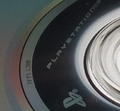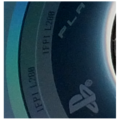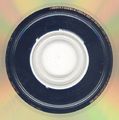Disc Identification/Serialization Data: Difference between revisions
m (→ROM Mark: typo) |
m (→ROM Mark: wikify) |
||
| Line 89: | Line 89: | ||
== ROM Mark == | == ROM Mark == | ||
ROM Mark or BD-ROM Mark is a serialization technology | ROM Mark or BD-ROM Mark is a serialization technology designed to make it more difficult for replication plants to do unlogged over-runs (being sold out the back door, without the copyright holder's knowledge) on a pressing. | ||
Only licensed BD-ROM manufacturers have access to the equipment that can make these unique ROM Marks (physical-layer to store key cryptographic secrets). | Only licensed BD-ROM manufacturers have access to the equipment that can make these unique ROM Marks (physical-layer to store key cryptographic secrets). | ||
Although every machine used to laser-cut a master disc is theoretically the same, the motor that spins the blank disc and moves the laser along a spiral track varies slightly in speed and precision. So if a digital marker is put in the middle of a recording, its physical position on the master disc - and every disc then pressed - will be a unique fingerprint of the cutting machine. | |||
The ROM Mark contains the Volume ID required to decrypt content encrypted using [http://en.wikipedia.org/wiki/Advanced_Access_Content_System AACS.] | The ROM Mark contains the Volume ID required to decrypt content encrypted using [http://en.wikipedia.org/wiki/Advanced_Access_Content_System AACS.] | ||
Revision as of 02:38, 20 December 2013
| This article is marked for rewrite/restructuring in proper wiki format. You can help PS3 Developer wiki by editing it. |
IFPI Code
International Federation of the Phonographic Industry
synonym: SID-Code (Source IDentification Code)
Used for marketing strategy, quality control and Anti-Piracy Compliance Program, there are two kinds of codes: a Mastering Code and a Mold Code. These 2 codes can be used to trace the location where discs are made.
The first two digits (in the case of a four digit SID Code) or the first three digits (in the case of a five digit SID Code) are assigned to the operator of the manufacturing or mastering plant. The last two digits of this code are allocated to give each mould on the site.
Using alphanumeric digits consisting of the numbers 0 through 9 and the letters of the Western alphabet A through Z,excluding “I”, “O”, “S” and “Q”, the plant has the ability to assign unique codes to 1,024 different mould code.- location: innerring outside datasection
- length:
- sample:
Sony DACD prefixes
- DVSS - Single-layer DVDs
- DVDL - Dual-layer DVDs
- BVSS - Single-layer Blu-ray Discs
- BVDL - Dual-layer Blu-ray Discs
- DRSS - DVD-ROM software titles
- PSRM - PlayStation titles
- PTRM - PlayStation 2 CD-ROM titles
- PDSS - PlayStation 2 DVD-ROM titles
- PDDL - PlayStation 2 DVD-ROM Dual-layer titles
- UPSS - PlayStation Portable UMD Single-layer titles
- UPDL - PlayStation Portable UMD Dual-layer titles
- BPSS - PlayStation 3 Blu-ray Disc Single-layer titles
- BPDL - PlayStation 3 Blu-ray Disc Dual-layer titles
PS4 ?
Patents and references
- http://www.google.com/#q=ifpi+patent
- http://home.lyse.net/bki/met/ifpi-codes.html
- http://www.ifpi.org/content/library/sid-code-implementation-guide.pdf
- http://www.ip.philips.com/data/downloadables/3/0/6/sid_implementationguide.pdf
Cutting Burst Area (CBA)
synonym: Burst Cutting Area (BCA)
The zone between radius 21.0 mm and 22.2 mm is reserved to be used as an optional BCA defined by the application.
- location: innerring inside datasection
- radius: 22.3 to 23.5mm
- datasize: 12 bytes to 188 bytes in steps of 16 bytes
- sample:
Patents and references
PIC Zone
Permanent Information & Control data
- location: within the Cutting Burst Area (CBA)
- datasize: 0x73 bytes
- sample:
Patents and references
Angular Marks
- location: in the data area, outside the Cutting Burst Area (CBA)
- sample:
Patents and references
- http://www.google.com/#q=angular+mark+patent
- http://debugmo.de/2008/11/anatomy-of-an-optical-medium-authentication/ (also CBA info)
ROM Mark
ROM Mark or BD-ROM Mark is a serialization technology designed to make it more difficult for replication plants to do unlogged over-runs (being sold out the back door, without the copyright holder's knowledge) on a pressing.
Only licensed BD-ROM manufacturers have access to the equipment that can make these unique ROM Marks (physical-layer to store key cryptographic secrets).
Although every machine used to laser-cut a master disc is theoretically the same, the motor that spins the blank disc and moves the laser along a spiral track varies slightly in speed and precision. So if a digital marker is put in the middle of a recording, its physical position on the master disc - and every disc then pressed - will be a unique fingerprint of the cutting machine.
The ROM Mark contains the Volume ID required to decrypt content encrypted using AACS.
- location:
- length:
- sample:
Patents and references
- http://www.google.com/#q=rom+mark+patent
- http://www.cdrinfo.com/Sections/News/Details.aspx?NewsId=15046
- http://www.cdrinfo.com/Sections/News/Details.aspx?NewsId=15194
Generic References
- http://www.blu-raydisc.com/assets/downloadablefile/bd-romwhitepaper20070308-15270.pdf (including page 40 SID, page 41 BCA, page 45 PIC Zone)
- http://www.patexia.com/us-patents/07278031 ´Patent 07278031 - Secure distribution of portable game software´ img
- Postscribed ID







